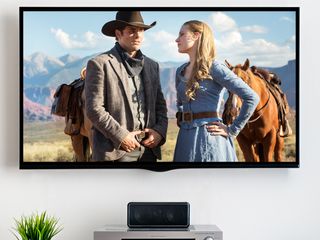What the AT&T-Time Warner Deal Means for the Future of Streaming
A federal judge has cleared the way for AT&T and Time Warner to complete their merger. What will that mean for cable, internet and wireless customers?
The Justice Department lost its federal court case yesterday (June 12) to block a merger between AT&T and Time Warner, clearing the way for the sale unless blocking appeals are filed. But why did the government want to stop this $85 billion deal, and what does the merger mean for us as media consumers?

What could go wrong?
Those opposed to the merger say AT&T could make streams of Time Warner channels smoother than those from rivals, raise distribution rates that would lead to higher prices for competitors and stop other services from carrying content such as HBO (so you'd have to pay AT&T to see the end of Game of Thrones). Next, this could create a template, where every broadcast company owns its own studio, and each turns their programming into an exclusive. At the very least, AT&T could raise the price of Time Warner's channels for its rivals, and that price hike could be reflected in the subscription costs.
The Trump Department of Justice challenged the merger, with antitrust chief Makan Delrahim, saying it will result in a less competitive and innovative pay-TV market. Some argue President Trump's opposition to the merger stems from his ax to grind with CNN, which is owned by Time Warner.
MORE: Best and Worst Cable TV Alternatives
What about the upside?
Proponents of the merger said that AT&T and Time Warner are not in the same business, removing the grounds for an antitrust case, and that the merger would benefit consumers with lower rates and more content, creating the kind of lareg company that could compete with the likes of Google or Facebook.
Sign up to get the BEST of Tom's Guide direct to your inbox.
Here at Tom’s Guide our expert editors are committed to bringing you the best news, reviews and guides to help you stay informed and ahead of the curve!
David McAtee, AT&T's general counsel, argued for his company's intentions in a statement: "We look forward to closing the merger on or before June 20 so we can begin to give consumers video entertainment that is more affordable, mobile, and innovative."
Arguments against the merger
Consumer advocates aren’t so sure. John Bergmayer, the senior counsel for Washington, D.C.-based nonprofit public interest group Public Knowledge, told Tom's Guide that the result of the case was "disappointing" and would only serve to continue the status quo for streaming media.
Specifically, Bergmayer said, "it gives the incumbents in the industry the chance to extend and continue existing distribution models from the cable TV world to the internet."
“It gives the incumbents in the industry the chance to extend and continue existing distribution models from the cable TV world, to the internet.”— John Bergmayer, senior counsel, Public Knowledge
Bergmayer explained that AT&T could raise the carriage fees of its Time Warner programming — such as CNN, a must-have for many — for competitors, such as Google (which owns YouTube TV) and Sony (which owns PlayStation Vue). He added that could lead to those companies "passing that cost along to customers, raising their rates."
Arguments for the merger
Proponents of a combined AT&T/Time Warner see things differently. Stephen Moore, a fellow at the conservative think-tank The Heritage Foundation, wrote an op-ed in The New York Times in favor of the merger, declaring that "there is probably no area in today’s economy where there is less threat of monopolistic power than in media and entertainment."
We shouldn't be worried because of the sheer mass of content out there, Moore added.
"The proliferation of video content and ways to get it means that these companies must stay innovative and affordable," he said, "or they are gone as fast as you can say Blockbuster Video."
“There is probably no area in today’s economy where there is less threat of monopolistic power than in media and entertainment.”— Stephen Moore, fellow, The Heritage Foundation
Echoing Judge Richard Leon, who ruled in favor of AT&T and Time Warner, Moore said the merger could have a positive effect by creating a company large enough to "bring welcome competition to Google and Facebook, which have captured about two-thirds of the online advertising market."
Moore admits that he can't promise that this merger will be good news: "It is too early to know whether this mega-deal will turn out well for shareholders and consumers."
How no more net neutrality changes things
However, the recent expiration of net neutrality regulations means that AT&T can behave however it wants when it comes to distributing digital content.
Ernesto Falcon, senior counsel for the Electronic Frontier Foundation, a digital-rights advocacy group in San Francisco, told Tom's Guide that he expects "AT&T to zero-rate all of its Time Warner content, for example, as a means to drive traffic towards itself."
In less technical terms, Falcon meant that AT&T could decide that Time Warner streaming media content would not count against a mobile or limited-broadband customer's monthly data caps.
"AT&T could see potential in taking HBO away from other providers. The money made by AT&T attracting customers could offset the losses."
Public Knowledge’s Bergmayer also raised the possibility that AT&T could take HBO away from other content-delivery providers, such as cable companies. Even though that would lead to a loss in programming sales, the money made by AT&T funneling customers to DirecTV could offset the losses.

AT&T buying Time Warner is just the beginning, it seems, of a bigger arms race. Even though Disney seems set to buy 21th Century Fox, Comcast, which already own NBCUniversal, just made a counteroffer. Either conglomerate could make a bid for Dish Network (which owns Sling TV). It seems that every major content distributor is realizing it needs to pair up with a content studio for leverage and negotiations.
Asked by Tom's Guide if the AT&T/Time Warner deal could benefit consumers, Bergmayer noted that "AT&T is already giving things that seem like deals for DirecTV Now."
"Yes, the AT&T customer might as well use DirecTV Now," he said, "but there's no perk that exceeds the benefit of what you could get in a more-competitive marketplace."
Of course, we're dealing in hypotheticals. Still, if we look at past incidents in which AT&T has allegedly banned competing services from its telephone networks, this new reality where every ISP owns its own content studio could be very dangerous for the smaller players.
"Net neutrality rules would have restrained [AT&T’s] ability to leverage the ownership of the network,” Falcon said. "But without the rules, I suspect we will see more major media companies start to contemplate merging with ISPs as a means to survive, or be prepared to pay AT&T substantial fees for equal treatment. "

Henry is a managing editor at Tom’s Guide covering streaming media, laptops and all things Apple, reviewing devices and services for the past seven years. Prior to joining Tom's Guide, he reviewed software and hardware for TechRadar Pro, and interviewed artists for Patek Philippe International Magazine. He's also covered the wild world of professional wrestling for Cageside Seats, interviewing athletes and other industry veterans.